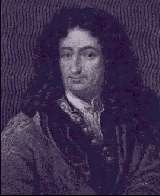
Born: July 1, 1646, in Leipzig, Germany
Died: November 14, 1716, in Hannover, Germany
Gottfried Wilhelm Leibniz was the son of Friedrich Leibniz, who was a professor of moral philosophy at the University of Liepzig. Liebniz had an insatiable appetite for learning and spent many hours absorbed in the books in his father's library.
His formal education began at the age of seven and he entered the University of Leipzig in 1661. He continued his studies at universities in Jena and Altdorf and earned a degree in philosophy and a doctorate in Law. After his graduation from Altdorf, he was offered employment by the university's faculty. He declined the offer and joined the public service.
He continued to serve under the archbishop elector of Mainz until a diplomatic posting took him to Paris in 1672. Four years in France had a profound influence on Leibniz. He was exposed to the works of many of the great philosophers including Galileo, Descartes, Pascal and Hobbes. The new ideas he encountered greatly influenced his own in the areas of mathematics and philosophy. It was in Paris that he developed the fundamental ideas for his calculus, physics and philosophy.
In 1676, Leibniz returned to Germany and rejoined the public service in Hannover. He held a number of different positions there but continued to develop his ideas on philosophy, mathematics and physics. In 1675 he advanced his theories on integral and differential calculus. At the same time, Isaac Newton was also in the process of developing calculus and it became somewhat of a competition to see who would be able to claim the discovery as their own and publish their theories first.
Leibniz published numerous works on topics as varied as mathematics, philosophy, history and law. Dynamics was an attempt to establish some fundamental laws of force and objects in motion. The unfinished work, Principles of Nature and Grace, and Monadology, were Leibniz's descriptions of his metaphysical model. He had hoped that his efforts in the field of philosophy would provide a common ground for unifying many of the divergent schools of thought, including Catholicism and Protestantism.
Most of Leibniz's life was spent in Hannover but he traveled extensively. While in Russia he was received by the Czar whom Leibniz held in high regard. He also spent time in Vienna where he was made an advisor to the empire and given the title of baron. He died in his bed in Hannover in 1716.